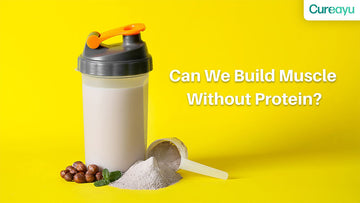Building muscle is a common goal for many fitness enthusiasts, and there is a widespread belief that consuming protein is the key to achieving this. But can we build muscle without protein? Is there any alternative approach to muscle development? In this blog, we will explore the importance of protein in muscle growth, whether muscle building is possible without it, and how you can make informed decisions about your fitness journey.
While protein is often regarded as the building block of muscles, some individuals may wonder if they can bypass heavy protein consumption and still gain strength and mass. Understanding how the body works, what role protein plays, and if there are alternative methods is essential in answering this question.
Also Read: Bulk vs Cut: Building Your Ideal Physique
What Is Protein?
Protein is a macronutrient essential for many bodily functions, particularly in repairing and building tissues. It consists of amino acids, which are the foundation for muscle growth and repair. These amino acids help to rebuild muscle fibers that are broken down during workouts. Without sufficient protein, the body struggles to maintain muscle mass, let alone build new muscle.
The Role of Protein in Muscle Building
Protein plays several key roles in muscle development:
- Repairing Muscle Tissue: After an intense workout, muscle fibers suffer microscopic tears. Protein helps repair these fibers, making them stronger and thicker.
- Muscle Growth: When muscles repair themselves with protein, they also grow in size, which is critical for muscle hypertrophy.
- Energy Source: While carbohydrates are the primary energy source during exercise, protein can also serve as a backup fuel for the body in the absence of carbs.
Also Read: Pump Up Your Gains: The Ultimate Protein Foods for Bodybuilding
Is It Possible to Build Muscle Without Protein?
Building muscle without protein, or with extremely low protein intake, is challenging and not recommended. Protein provides the necessary building blocks for muscle growth. Here’s why:
- Limited Muscle Recovery: Without adequate protein, muscle recovery is hindered, which can lead to fatigue, soreness, and slower muscle development.
- Catabolism: A lack of protein can cause the body to break down existing muscle tissue for energy, leading to muscle loss rather than growth.
While carbohydrates and fats provide energy, they do not directly contribute to the repair or growth of muscles in the same way protein does.
How Much Protein Do You Really Need for Muscle Growth?
While the importance of protein for muscle building is clear, understanding the right amount to consume is crucial. Here are some factors that determine your protein needs:
- Body Weight: Protein needs are often calculated based on body weight. A general guideline is 1.2 to 2.2 grams of protein per kilogram of body weight, depending on activity level.
- Training Intensity: The more intense and frequent your workouts, the higher your protein requirements will be to repair and build muscles.
- Age: Older individuals may require more protein to maintain muscle mass, as muscle loss becomes more prevalent with age.
- Dietary Restrictions: Vegetarians and vegans may need to pay closer attention to their protein sources to ensure they're getting enough, especially complete proteins that contain all essential amino acids.
- Gender: Men typically need more protein than women, mainly due to higher muscle mass and metabolic rates.
- Muscle Gain Goals: If you aim to increase muscle size significantly, higher protein intake will be necessary compared to maintaining or toning muscles.
- Recovery Needs: Post-workout protein is vital for muscle recovery, and many experts recommend consuming 20-30 grams of protein within 30 minutes after exercise.
Also Read: The Incredible Benefits of Leg Workouts: Why Skipping Leg Day is a Mistake You Can’t Afford
Can You Rely on Carbs and Fats Alone for Muscle Growth?
Carbohydrates and fats are crucial for overall energy, but they cannot replace the role of protein. Here's why:
- Carbohydrates: These provide the primary fuel source for high-intensity workouts, but they don't assist in muscle repair. A carb-heavy diet will supply energy but won't help in rebuilding muscle fibers.
- Fats: Fats help with hormone regulation and long-term energy storage, yet, they don't contribute to the rebuilding of muscle mass. Healthy fats are essential for maintaining overall health but not for muscle hypertrophy.
Can Plant-Based Proteins Be an Alternative?
If you are trying to limit traditional sources of protein, such as meat and dairy, plant-based proteins can be a valuable alternative. These include:
- Legumes (beans, lentils)
- Tofu and tempeh
- Quinoa
- Chia seeds
- Nuts and seeds
Plant-based proteins may not have all the essential amino acids in one source, but combining different plant foods can ensure you get the full range of amino acids needed for muscle building.
Also Read: Understanding Which Age is Best for Gym Workouts: When Should You Start Exercising
Tips to Support Muscle Growth with a Balanced Diet
Even if you want to limit protein, there are a few ways to support muscle growth:
- Ensure Sufficient Caloric Intake: Ensure you're eating enough calories to fuel your body during workouts and recovery.
- Focus on Resistance Training: Progressive overload in weightlifting can promote muscle growth even when protein intake is lower than recommended.
- Time Your Nutrient Intake: Eat nutrient-rich foods around your workout times to maximize recovery and muscle repair.
- Incorporate Protein-Rich Snacks: Even on a limited protein diet, you can incorporate smaller, protein-rich snacks throughout the day to support muscle recovery.
Conclusion
In short, building muscle without protein is not practically feasible. Protein is a vital component of muscle growth and recovery. While it's technically possible to build some muscle with very low protein intake by focusing on resistance training and caloric intake, the results will be far slower and less efficient. Plant-based proteins and carefully balanced diets can help, but protein remains the cornerstone of any successful muscle-building regimen. Ensure you prioritize adequate protein intake to optimize your muscle growth and overall fitness.








